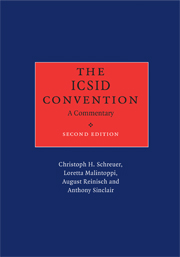Book contents
- Frontmatter
- Contents
- Foreword by Professor Sir Elihu Lauterpacht, CBE, QC
- Authors' preface to the second edition
- Table of cases
- List of abbreviations
- Text of the ICSID Convention
- Procedural calendar
- PREAMBLE
- CHAPTER I International Centre for Settlement of Investment Disputes
- CHAPTER II Jurisdiction of the Centre
- CHAPTER III Conciliation
- CHAPTER IV Arbitration
- CHAPTER V Replacement and Disqualification of Conciliators and Arbitrators
- CHAPTER VI Cost of Proceedings
- Article 59 Charges of the Centre
- Article 60 Fees and Expenses
- Article 61 Apportionment of Expenses
- CHAPTER VII Place of Proceedings
- CHAPTER VIII Disputes between Contracting States
- CHAPTER IX Amendment
- CHAPTER X Final Provisions
- Final Clause
- Consolidated bibliography
- Index by article
- Index by subject
Article 60 - Fees and Expenses
from CHAPTER VI - Cost of Proceedings
Published online by Cambridge University Press: 07 September 2010
- Frontmatter
- Contents
- Foreword by Professor Sir Elihu Lauterpacht, CBE, QC
- Authors' preface to the second edition
- Table of cases
- List of abbreviations
- Text of the ICSID Convention
- Procedural calendar
- PREAMBLE
- CHAPTER I International Centre for Settlement of Investment Disputes
- CHAPTER II Jurisdiction of the Centre
- CHAPTER III Conciliation
- CHAPTER IV Arbitration
- CHAPTER V Replacement and Disqualification of Conciliators and Arbitrators
- CHAPTER VI Cost of Proceedings
- Article 59 Charges of the Centre
- Article 60 Fees and Expenses
- Article 61 Apportionment of Expenses
- CHAPTER VII Place of Proceedings
- CHAPTER VIII Disputes between Contracting States
- CHAPTER IX Amendment
- CHAPTER X Final Provisions
- Final Clause
- Consolidated bibliography
- Index by article
- Index by subject
Summary
INTRODUCTION
Art. 60 is part of the Convention's Chapter VI on “Cost of Proceedings”. It deals with the remuneration and expenses of conciliators and arbitrators. Other instruments regulating international arbitration also contain detailed provisions on the fees and expenses of arbitrators.
Art. 60 also applies to members of ad hoc committees established in accordance with Art. 52(3). Art. 52(4) extends the application of Art. 60 to proceedings before an ad hoc committee. In addition, Administrative and Financial Regulation 14(1), dealing with the fees and expenses of conciliators and arbitrators, by its own terms also applies to members of ad hoc committees.
INTERPRETATION
The drafts leading to the Convention originally provided that, in the absence of an agreement with the parties, the commission or tribunal was to fix its fees and expenses after consultation with the Secretary-General (History, Vol. I, pp. 268, 270). There were suggestions to determine these amounts not on an ad hoc basis but in accordance with predetermined guidelines or tariffs (History, Vol. II, pp. 277/8, 437, 531, 898, 993). This led to the adoption of the text that foresees limits established by the Administrative Council.
- Type
- Chapter
- Information
- The ICSID ConventionA Commentary, pp. 1218 - 1222Publisher: Cambridge University PressPrint publication year: 2009



